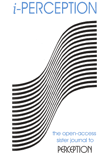
I-Perception
Scope & Guideline
Exploring the Depths of Perception Across Disciplines
Introduction
Aims and Scopes
- Visual Perception:
The journal emphasizes research on visual perception, including studies on illusions, depth perception, and the interaction between visual stimuli and cognitive processes. - Crossmodal Perception:
A significant area of focus is the interaction between different sensory modalities, such as how visual cues influence auditory perception or vice versa, highlighting the integrative nature of perception. - Psychophysics:
I-Perception publishes studies that employ psychophysical methods to quantitatively assess perceptual thresholds and the relationship between stimuli and perception. - Developmental and Age-Related Perception:
The journal explores how perception changes across the lifespan, including developmental studies in children and age-related changes in sensory processing. - Neurophysiological Underpinnings of Perception:
Research investigating the neural mechanisms and brain processes involved in perception is a core area, encompassing studies using neuroimaging and electrophysiological techniques. - Applied Perception:
The journal also addresses applied aspects of perception, such as the implications of perceptual research in fields like design, marketing, and technology.
Trending and Emerging
- Virtual and Augmented Reality:
There is a growing interest in how virtual and augmented reality environments affect perception, particularly in studies examining embodiment, presence, and the effects of immersive technologies. - Multisensory Integration:
Research focusing on multisensory integration has gained traction, investigating how different sensory modalities work together to shape our perceptual experiences in complex environments. - Cognitive and Emotional Influences on Perception:
Emerging studies are increasingly examining how cognitive factors, such as attention and emotion, influence perceptual processes, highlighting the interplay between cognition and sensory experience. - Perception in Non-Traditional Contexts:
Investigations into perception in unique contexts, such as the effects of social distancing, face masks, and other pandemic-related factors, have become more prominent, reflecting current societal issues. - Technological Applications of Perception Research:
There is an uptick in research exploring the applications of perceptual science in technology, including the design of user interfaces, marketing strategies, and enhancing virtual experiences.
Declining or Waning
- Traditional Art Perception:
Research focusing on classical art perception and the aesthetic evaluation of traditional artworks has decreased, possibly as the field shifts towards more contemporary and interdisciplinary approaches. - Static Visual Illusions:
Studies centered on static visual illusions have waned, indicating a potential move towards dynamic and more complex perceptual phenomena that better reflect real-world experiences. - Single-Sensory Studies:
There appears to be a decline in research focusing solely on single sensory modalities without considering crossmodal interactions, as the field increasingly recognizes the importance of integrative approaches. - Basic Visual Processing:
Investigations into basic visual processing mechanisms, such as simple shape and color perception, seem to be less frequent, possibly due to a growing interest in more complex and applied perceptual phenomena. - Historical Perspectives:
The publication of papers with a purely historical focus on perception theories has decreased, indicating a trend towards empirical and experimental research over theoretical or historical reviews.
Similar Journals
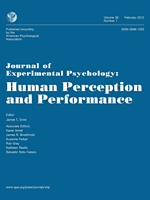
JOURNAL OF EXPERIMENTAL PSYCHOLOGY-HUMAN PERCEPTION AND PERFORMANCE
Connecting theory and practice in human perception and performance.JOURNAL OF EXPERIMENTAL PSYCHOLOGY: HUMAN PERCEPTION AND PERFORMANCE, published by the American Psychological Association, stands as a premier outlet for scholarly research in the fields of psychology and neuroscience. This esteemed journal, identified by its ISSN 0096-1523 and E-ISSN 1939-1277, provides an essential platform for groundbreaking studies focusing on human perception, cognitive processes, and performance. With a remarkable impact reflected in its Q1 ranking across multiple categories including Arts and Humanities, Behavioral Neuroscience, and Experimental and Cognitive Psychology, this journal maintains a prestigious position in academic discourse. Researchers and practitioners can look forward to contributing to and accessing a repository of knowledge that spans nearly five decades, with articles that adhere to the highest scientific standards. As a valuable resource without open access constraints, it invites a wide readership engaged in advancing psychological science and understanding the intricacies of human behavior.
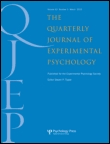
QUARTERLY JOURNAL OF EXPERIMENTAL PSYCHOLOGY
Transforming Understanding Through Empirical StudiesQuarterly Journal of Experimental Psychology, published by SAGE Publications Ltd, is a leading peer-reviewed journal that serves as a vital resource in the fields of experimental and cognitive psychology, neuropsychology, and medicine. With an impactful contribution to psychological research, the journal is recognized for its rigorous methodology and empirical studies, holding a notable ranking among its peers—finding itself in the Q2 quartile across several categories. With its origin tracing back to 2006, Quarterly Journal of Experimental Psychology significantly influences the academic discourse until its latest published findings in 2024. Catering to a diverse audience of researchers, professionals, and students, this journal provides Open Access options, enhancing the reach and accessibility of cutting-edge psychological research. By focusing on innovative approaches and findings, it aims to bridge theoretical understanding with practical application, hence fostering advancement in multiple related disciplines. For those committed to understanding the complexities of human behavior and cognitive processes, this journal remains an essential reference point.

ANIMAL COGNITION
Transforming Perspectives on Animal Minds through Rigorous ScienceANIMAL COGNITION is a prestigious academic journal dedicated to the exploration of cognitive processes in non-human animals, bridging the fields of ecology, evolution, behavior, and cognitive psychology. Published by Springer Heidelberg in Germany, this journal has established itself as a leading platform for innovative research since its inception in 1998, showcasing important findings that enhance our understanding of animal minds. With an impressive impact factor reflected in its Q2 rankings within both the Ecology, Evolution, Behavior, and Systematics and Experimental and Cognitive Psychology categories, ANIMAL COGNITION serves as an invaluable resource for researchers, professionals, and students alike. Although it currently does not offer open access, the journal's rigorous peer-review process ensures the highest quality of published research, making it a vital component of scholarly discourse in the study of animal cognition. As the journal continues to evolve into 2024 and beyond, it remains committed to advancing our knowledge while inspiring future generations of researchers in this fascinating field.
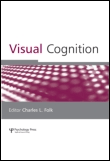
VISUAL COGNITION
Shaping the Future of Visual Cognition StudiesVISUAL COGNITION, published by Routledge Journals, Taylor & Francis Ltd, is a leading academic journal dedicated to the nuanced understanding of visual processing and cognition. Since its inception in 1994, the journal has become a pivotal resource for researchers and practitioners in fields including Cognitive Neuroscience and Psychology, having achieved a distinguished Q1 ranking in Arts and Humanities and impressive standings among its peers in experimental and cognitive psychology. With an impact factor reflecting its scholarly significance, VISUAL COGNITION serves as a forum for high-quality research articles that shed light on the cognitive aspects of visual perception. Although it operates under a subscription model, the journal remains committed to disseminating knowledge that inspires both established and emerging scholars alike. For those interested in the latest advancements in visual cognition, this journal promises a wealth of insights and rigorous scholarly dialogue.
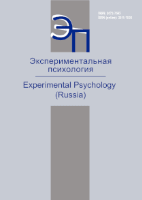
Eksperimentalnaya Psikhologiya
Illuminating the pathways of cognitive exploration.Eksperimentalnaya Psikhologiya is a prominent open-access journal published by the Moscow State University of Psychology and Education, dedicated to advancing the field of psychology. Since its inception, the journal has offered a platform for the dissemination of innovative research in Experimental and Cognitive Psychology, as well as Neuropsychology and Physiological Psychology. The journal's commitment to open access, initiated in 2015, ensures that valuable research findings are freely available to scholars and practitioners worldwide. Although currently categorized in the Q4 quartile for 2023 within several psychology disciplines, it plays a vital role in promoting a diverse range of psychological studies and fostering interdisciplinary collaboration. With a focus on experimental methodology and cognitive processes, Eksperimentalnaya Psikhologiya provides a valuable resource for researchers, professionals, and students seeking to deepen their understanding of psychological science. The journal invites contributions from across the globe, particularly in the evolving landscapes of experimental techniques and neuropsychological research.

MUSIC PERCEPTION
Exploring the Soundscape of Human ExperienceMUSIC PERCEPTION is a prestigious academic journal dedicated to the interdisciplinary exploration of musical experience and understanding. Published by the University of California Press, this journal has established itself as an essential resource in the field of music psychology, with a strong emphasis on how auditory stimuli influence human cognition and emotion. The journal boasts a commendable Q1 ranking in Music, placing it within the top-tier of scholarly publications, and it holds an impressive Scopus Rank of #4 out of 180 in the Arts and Humanities category, reflecting its critical role in advancing research within this domain. MUSIC PERCEPTION welcomes contributions that delve into diverse topics, including auditory perception, acoustics, and the psychological impacts of music, making it a vital platform for researchers, professionals, and students seeking to deepen their understanding of music's multifaceted nature. The journal is published annually and remains a cornerstone for academic discourse, ensuring that new findings are readily accessible to a global audience.

Review of Philosophy and Psychology
Unveiling the Synergy of Philosophy and Experimental PsychologyReview of Philosophy and Psychology, published by Springer, stands as a pivotal journal at the intersection of two influential disciplines. Operating under the ISSN 1878-5158, this esteemed publication has garnered attention since its inception in 2010, with a clear commitment to advancing the discourse in both Experimental and Cognitive Psychology and Philosophy. Notably, it has achieved impressive rankings in 2023, placing in the Q2 category for Experimental and Cognitive Psychology and Q1 category for Philosophy, further enhancing its credibility and appeal among scholars. With a notable Scopus ranking of #26 in Philosophy and #40 in Experimental Psychology, the Review of Philosophy and Psychology serves as an essential platform for the dissemination of research that equips readers with multifaceted insights and fosters interdisciplinary dialogue. While the journal maintains traditional access options, it continues to contribute significantly to its fields with high-quality articles that challenge and expand existing paradigms. As such, it is an invaluable resource for researchers, professionals, and students eager to explore and understand the nuanced relationships between philosophical inquiry and psychological research.
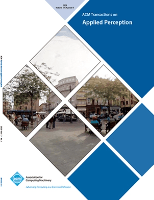
ACM Transactions on Applied Perception
Innovating Understanding of Human Perception with TechnologyACM Transactions on Applied Perception is a leading journal published by the Association for Computing Machinery, focusing on the intersection of perception science and computational methods. With an ISSN of 1544-3558 and an E-ISSN of 1544-3965, this esteemed publication has been a vital resource for innovators and researchers since its establishment in 2004. It operates within the ambit of Computer Science and the realms of Experimental and Cognitive Psychology, boasting a commendable impact factor and category rankings, including Q2 in Computer Science (miscellaneous) and Q3 in both Experimental and Cognitive Psychology and Theoretical Computer Science. The journal's scope encompasses a plethora of studies aimed at understanding human perception through computational lenses, making it an essential platform for scholarly exchange. Although it does not currently offer an Open Access option, its extensive reach and rigorous peer-review process ensure high visibility and impact in the academic community. By fostering collaboration across disciplines, ACM Transactions on Applied Perception encourages advancements that bridge perceptual research with practical applications, making it invaluable for researchers, professionals, and students engaged in this dynamic field.
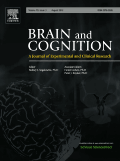
BRAIN AND COGNITION
Exploring the Nexus of Mind and BrainBRAIN AND COGNITION, published by Academic Press Inc Elsevier Science, stands as a vital resource for researchers and practitioners in the realms of cognitive neuroscience and psychology. Established in 1982, the journal has continuously evolved, showcasing cutting-edge research that bridges the understanding of brain functions and cognitive processes up to 2024. With an impressive impact factor reflecting its commitment to high-quality scholarship, the journal currently holds a prestigious Q1 ranking in Arts and Humanities (miscellaneous) and notable Q2 rankings in various psychology fields, including Cognitive Neuroscience, Developmental and Educational Psychology, Experimental and Cognitive Psychology, and Neuropsychology. This multidisciplinary journal cultivates a rich academic dialogue, offering valuable insights to professionals, researchers, and students alike. Although it does not offer open access, its robust indexing in Scopus and consistent contribution to important discussions in cognitive research define its critical role in advancing knowledge and innovation in the cognitive sciences.
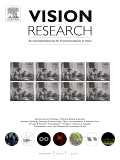
VISION RESEARCH
Illuminating the complexities of vision.VISION RESEARCH, published by PERGAMON-ELSEVIER SCIENCE LTD, is a leading journal in the field of visual sciences, focusing on the diverse aspects of ophthalmology and sensory systems. With a rich publication history dating from 1961 and extending into 2024, this journal has become a cornerstone for researchers and practitioners alike, offering critical insights into vision science. The journal holds a commendable Q2 ranking in Ophthalmology and a Q3 ranking in Sensory Systems, evidencing its significant contribution to these fields. VISION RESEARCH also boasts a respectable Scopus ranking, placing it in the 66th percentile for Ophthalmology and 46th percentile for Neuroscience. Although it is not an Open Access journal, readers can access its impactful research through various academic institutions. With its emphasis on innovative research and developments in understanding visual perception, VISION RESEARCH is an essential resource for scientists, clinicians, and students dedicated to advancing the understanding of vision and its associated mechanisms.